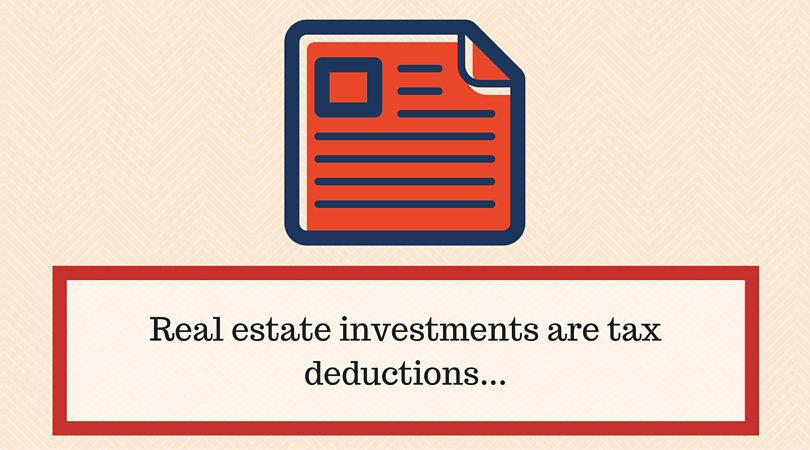
Here is the most important mind-shift you must make about your taxes if you want to build true wealth: the government rewards investors.
Let me put this another way: the government needs people willing to build and invest in the economy. Without these people, we turn into a third-world country. So how does Uncle Sam encourage you to invest? Tax incentives.
Real estate investment is one of the most tax-friendly industries. It has saved my family thousands of dollars in Tax Day bills. Before we invested our money in real estate, my wife and I would break out a shot of hard liquor and write 5-figure checks to the IRS every year. But no more!
Here are three reasons investing in real estate can help lower your tax burden too:

1. Real estate investments are tax deductions.
The money you spend on an investment property is money the government will not tax. They are so happy that you are improving our cities and investing in growth, they will leave those dollars alone.
Let’s say your accountant estimates that you will owe $40,000 in Federal taxes next year and you still have some time until the calendar year is up. Would you rather cut that check to the IRS and NEVER see that money again? Or would you rather invest it in a cash-flowing property in exchange for a monthly return on that investment? For us, that is a no-brainer. If I have to spend that $40,000 anyway, I would much prefer the latter to the former! (Ask me about finding properties for $40,000 or less! It is not as difficult as you think!)
2. Real estate depreciations work in your favor.
In the house you live in, you cannot claim depreciation expenses unless you rent out a part of your home or run a small business out of your home. My guess is that most of you don’t do that.
But you CAN claim depreciation on your investment properties! This can be a big deduction with certain accounting ninja tricks such as straight line depreciation. Your wonderful accountant can help you with this and in some cases, this can take a large weight off your tax burden. And if your accountant is not wonderful or experienced with real estate investors, it may be time for a breakup. More about that in a future post!
3. Some personal expenses are also deductions.
As your real estate investments grow, you may soon consider yourself a small business. Several investors create LLCs or S-Corps to protect their investments. Whether or not this is right for you is another conversation for that wonderful accountant.
Here is the beauty of being a small business: your money is now taxed with the same friendly tax laws as other corporations. Businesses don’t pay taxes on the money they re-invest on business expenses and now, neither do you. So here is the trick: you pay as many *legitimate* expenses out of your corporation as you can and turn those life expenses into write-offs. Examples include your cell phone bill, your broadband, perhaps your vehicle expenses. Why pay those out of your personal post-tax checking account when you can pay them in your business account and write them off on your taxes?
Let me be clear, this does NOT mean that you pay for your children’s summer camp out of your business account and hope the IRS does not audit you. No, no, no. This is not a trick. It is a legitimate use of the tax laws as they were written.
These three tax incentives may sound simple but they add up and can mean all the difference in your tax strategy. The wealthy do not create big businesses and then clench down on Tax Day and hope for the best. They have solid tax strategies in place year-round and as a new investor, now you do too!
Ready To Build Passive Income Through Rental Real Estate?
Ready to talk about your goals? We're here to show you the tools and teach you the process to begin earning legacy wealth for you and your family.








